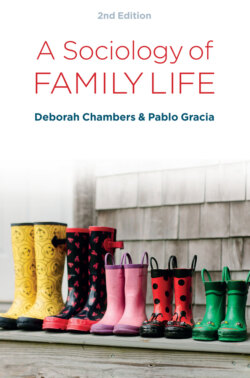Читать книгу A Sociology of Family Life - Deborah Chambers - Страница 16
Race and ethnicity in family studies
ОглавлениеMainstream sociological approaches towards race and class in the 1950s and 1960s were heavily influenced by functionalist theory. Studies tended to elevate the white, middle-class nuclear family as a standard by which all family types were measured (Roschelle 1997). For instance, Parsons (1971) identified African American families as less stable than white nuclear families. Although these families had been disadvantaged by a rigid system of racial stratification and discrimination, Parsons claimed that they generated ‘family disorganization’: a weakening of family ties resulting from marital separation and divorce. However, he was criticized for ignoring the resilience and stability of extended kinship networks among Black families, despite the high percentage of female-headed households.
The ‘culture of poverty approach’ in 1960s American family sociology asserted that African Americans and Chicanos attach no special importance to the ‘nuclear’ family. Instead, they favour the extended kinship network. However, this supposition was often ahistorical and ignored the possibility that an African cultural heritage might characterize the African American family. Extended kinship ties might be an effective way of responding to racism or poverty or might have historical roots in past cultures and places. The unique socio-political histories, migration patterns and cultural norms of minority ethnic groups were ignored by the culture of poverty approach (Roschelle 1997). Since the framework of the culture of poverty perspective was predicated on the assumption of a white, middle-class, normative model, the strength of extended kinship ties among African Americans was underestimated. African American family traits, such as extended kinship networks, were viewed as deviant and disorganized.
The portrayal of African American women as ‘matriarchs’ encouraged scholars who standardized the dominant white group to blame African American women for the poor educational achievements of their children and to ignore racism as a form of social disadvantage and exclusion. The social and economic inequalities and forms of discrimination that disadvantaged African American mothers and their children were sidestepped by the idea that intergenerational poverty was inherited through a pathological family value system. For instance, American sociologist Daniel Patrick Moynihan (1965) argued that African American occupational and economic inequality was caused by family disorganization. ‘Cultural pathology’ was held responsible for the prevalence of women-headed urban families. These women were often referred to disparagingly as ‘welfare queens’, even though this pattern of inequality corresponded with the scarcity of well-paid, secure employment for African American men. Likewise, the culture of poverty approach towards Latino families reflected racial and ethnocentric prejudice that privileged white, middle-class culture and condemned other family forms (Staples and Mirande 1980).
The culture of poverty approach advanced by the Moynihan report (1965) was criticized from multiple angles. First, the rise of poverty, unemployment and social disturbances in urban ghettos of America was overlooked (Wilson 1991). Scholars were critiqued for regarding the so-called culture of poverty as an outcome rather than a cause of the racialized underclass. Second, the ‘strength resiliency’ perspective which emerged in the 1970s highlighted the positive features of African American family life within extended families. This resilience was characterized by the stability of ties between parents and children, informal support networks and the shared community responsibility for children (Aschbrenner 1978). However, while the strength resiliency standpoint acknowledged the diversity of African American families (Nobles 1974), it overlooked the effects of poverty on family organization at the community level (Wilson 1991). Third, authors such as Douglas Massey and Nancy Denton (1993) stressed that institutional racism and a history of slavery played a central role in laws and market discriminatory policies that contributed to urban and racial segregation. In turn, these forms of racial discrimination directly impacted on the creation of a racialized ‘underclass’.
Similar problems were exposed in the sociological study of minority ethnic families in Western European countries such as Britain and France. In Britain, Caribbean families who migrated to the UK after World War II, from the late 1940s, deviated from the white middle-class family structure. They were labelled as deviant since it was found that, rather than having patriarchal families headed by a male breadwinner, women played a central role in matrifocal families that lacked male permanent presence (Chamberlain 1999). A high proportion of households headed by single mothers among British African Caribbean families was correlated with high levels of ‘welfare dependency’ and social deviance in the community (Dench 1996). Once again, the colonial legacy of slavery and twentieth-century migration were factors neglected in sociological research on minority ethnic families in Britain. From the 1980s and 1990s, the dynamics of migration and the damaging effects of institutional racism and poverty were being uncovered in research on British minority ethnic families (Chamberlain 1999). For example, the exposure of these racial and ethnic inequalities helps us to understand why Britain has displayed persistent job market discrimination towards non-white applicants over recent decades (Heath and Di Stasio 2019).
